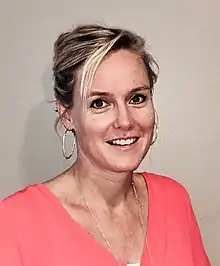Lori E. Dodd | |
|---|---|
 | |
| Alma mater | University of Utah Honors College (BA) University of Washington (PhD) |
| Scientific career | |
| Fields | Mathematical statistics, clinical trials |
| Institutions | National Institutes of Health |
| Thesis | Regression methods for areas and partial areas under the receiver-operating characteristic curve (2001) |
| Doctoral advisor | Margaret Sullivan Pepe |
| Other academic advisors | Per Hage |
Lori Elizabeth Dodd is an American mathematical statistician specializing in clinical trials methodology, statistical analysis of genomic data, design of clinical trials using biomarkers and imaging modalities, and statistical methods for analyzing biomarkers. She is a statistician in the biostatistics research branch at the National Institute of Allergy and Infectious Diseases.
Education
In 1995, Dodd completed a bachelor's degree in the department of anthropology at the University of Utah Honors College. Her undergraduate thesis was titled, The old people know different: Navajo aging and the aged in the context of change. Dodd's undergraduate academic advisor was Per Hage, and Charles C. Hughes served as her thesis supervisor.[1] In 2001, she earned a Ph.D. in the department of biostatistics at the University of Washington.[2] Her dissertation was titled Regression methods for areas and partial areas under the receiver-operating characteristic curve. Dodd's doctoral advisor was Margaret Sullivan Pepe.[3]
Career
Dodd worked at the National Cancer Institute in the biometric research branch to evaluate imaging in oncology trials.[2]
Dodd is a mathematical statistician in the division of clinical research's biostatistics research branch at the National Institute of Allergy and Infectious Diseases (NIAID). She specializes in clinical trials methodology, statistical analysis of genomic data, design of clinical trials using biomarkers and imaging modalities, and statistical methods for analyzing biomarkers.[4] At NIAID, she researches the statistical assessment of medical diagnostic tests and clinical trial design.[2]
In 2016, Dodd conceived of and edited a special issue on Ebola for the journal Clinical Trials, which highlighted different approaches to trial design and various viewpoints from the individuals and organizations who contributed to research efforts.[5]
References
- ↑ Dodd, Lori Elizabeth (1995). The old people know different: Navajo aging and the aged in the context of change (Thesis). University of Utah Honors College. OCLC 33130357.
- 1 2 3 "Dodd: Two Topic Imaging Workshop Biosketches" (PDF). Radiological Society of North America.
- ↑ Dodd, Lori Elizabeth (2001). Regression methods for areas and partial areas under the receiver-operating characteristic curve (Thesis). University of Washington. OCLC 48806947.
- ↑ "Lori E. Dodd, Ph.D. | NIH: National Institute of Allergy and Infectious Diseases". National Institute of Allergy and Infectious Diseases. 19 October 2016. Retrieved 2020-05-11.
 This article incorporates text from this source, which is in the public domain.
This article incorporates text from this source, which is in the public domain. - ↑ "NIH Experts Offer Lessons Learned from the 2014-2015 Ebola Outbreak | NIH: National Institute of Allergy and Infectious Diseases". National Institute of Allergy and Infectious Diseases. January 14, 2016. Retrieved 2020-05-11.
 This article incorporates text from this source, which is in the public domain.
This article incorporates text from this source, which is in the public domain.
External links
- Lori E. Dodd publications indexed by Google Scholar